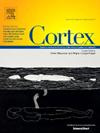胼胝体发育不良的非能动口语
IF 3.2
2区 心理学
Q1 BEHAVIORAL SCIENCES
引用次数: 0
摘要
胼胝体发育不良(CCD)是一种先天性脑畸形,是指胼胝体的发育部分或完全中断。CCD 患者的认知结果差异很大,但一般来说,其神经心理学特征是处理速度缓慢、半球间感觉运动信息传递不畅以及复杂问题解决能力受损。CCD 患者的核心语言能力通常得以保留,但有证据表明复杂语言能力可能会受损。因此,本研究试图探讨与年龄匹配的对照组相比,CCD 患者的自发言语输出是否会减少。我们还进一步探讨了一系列可能导致 CCD 患者自发言语能力低下的因素,如产生、选择和排序表达想法的困难,以及冷漠和处理速度减慢等。本研究共招募了 25 名 CCD 患者和 39 名神经典型对照者。参与者在完成一系列认知和语言基线测试的同时,还完成了一项图片描述任务,以测量自发言语输出。言语和非言语流畅性任务测量想法的产生和排序,句子级选择任务测量想法的选择。我们发现,尽管 CCD 患者的核心语言技能基本完好,但他们在图片描述任务中的自发言语能力明显低于对照组。这种语言特征可被称为 "非动态"。此外,我们还发现,CCD 患者的自发言语能力差与产生表达想法的问题有关,因为 CCD 患者在言语和非言语流畅性任务中的表现低于对照组。探索性分析表明,冷漠和处理速度减慢可能是诱因。CCD 中的 "失语症 "是一项新发现,可作为改善该人群交流技能的干预目标。本文章由计算机程序翻译,如有差异,请以英文原文为准。
Adynamic spoken language in corpus callosum dysgenesis
Corpus callosum dysgenesis (CCD) is a congenital brain malformation that occurs when the development of the corpus callosum is disrupted, either partially or completely. The cognitive outcomes in individuals with CCD vary greatly, but generally the neuropsychological profile is characterised by slow processing speed, poor transfer of interhemispheric sensory-motor information, and impaired complex problem solving. Core language skills are often preserved in CCD, but there is some evidence that complex language may be impaired. Thus, the current study sought to examine whether spontaneous speech output was reduced in a cohort of individuals with CCD compared to age-matched controls. We further explored a series of factors that may be contributing to poor spontaneous speech in CCD, such as difficulties generating, selecting, and sequencing ideas for expression, as well as apathy and slowed processing speed. A cohort of 25 individuals with CCD and 39 neurotypical controls were enrolled in this study. Participants completed a picture description task to measure spontaneous speech output, alongside a series of cognitive and language baseline tests. Verbal and nonverbal fluency tasks gauged idea generation and sequencing, and sentence-level selection tasks measured idea selection. We found that, despite having largely intact core language skills, individuals with CCD produced significantly less spontaneous speech on the picture description task than controls. This language profile may be described as “adynamic”. Further, we found that poor spontaneous speech output in CCD was related to problems generating ideas for expression, as individuals with CCD performed below controls on the verbal and nonverbal fluency tasks. Exploratory analyses revealed that apathy and slowed processing speed may be contributing factors. Adynamia in CCD is a novel finding that may be an intervention target for improving communication skills in this population.
求助全文
通过发布文献求助,成功后即可免费获取论文全文。
去求助
来源期刊

Cortex
医学-行为科学
CiteScore
7.00
自引率
5.60%
发文量
250
审稿时长
74 days
期刊介绍:
CORTEX is an international journal devoted to the study of cognition and of the relationship between the nervous system and mental processes, particularly as these are reflected in the behaviour of patients with acquired brain lesions, normal volunteers, children with typical and atypical development, and in the activation of brain regions and systems as recorded by functional neuroimaging techniques. It was founded in 1964 by Ennio De Renzi.
 求助内容:
求助内容: 应助结果提醒方式:
应助结果提醒方式:


